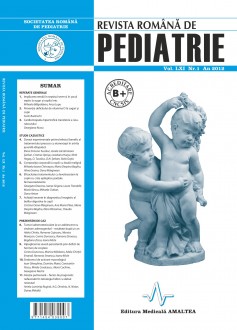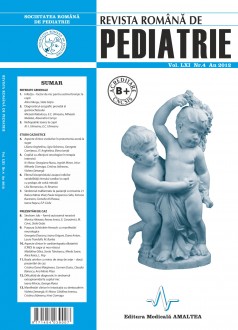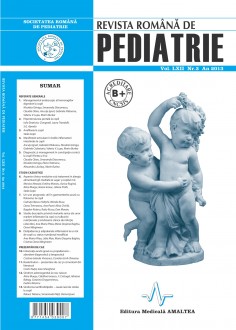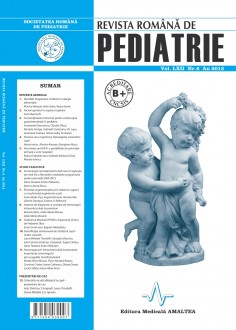SELECT ISSUE

Indexed

| |

|
|
|
| |
|
|
|

|
|
|
|
|
|
|
HIGHLIGHTS
National Awards “Science and Research”
NEW! RJP has announced the annually National Award for "Science and Research" for the best scientific articles published throughout the year in the official journal.
Read the Recommendations for the Conduct, Reporting, Editing, and Publication of Scholarly work in Medical Journals.
The published medical research literature is a global public good. Medical journal editors have a social responsibility to promote global health by publishing, whenever possible, research that furthers health worldwide.
Efficacy of Levetiracetam in children with drug resistant partial seizures
Georgeta Diaconu, Ioana Grigore, Laura Trandafir, Maria Iliescu, Mihaela Cioban and Dana Anton
ABSTRACT
Epilepsy is frequently diagnosed in the pediatric age raising numerous issues related to treatment. Levetiracetam (LEV) is an antiepileptic drug (AED) which is approved as a new combination therapy in different types of drug resistant seizures. The purpose of this study was to evaluate the efficacy and safety of LEV in combination with drug resistant therapy in partial epilepsies children. The study group included 63 children diagnosed with various forms of partial epilepsy. All patients received antiepileptic medication in monotherapy or polytherapy without remission of seizures. Levetiracetam has been associated with MAE initial dose of 10 mg/kg/day (two administrations), the dose was increased up to 40 mg/kg/day within 6 weeks. Patients were studied for a further period of six months. Among children who received associated LEV 34 (53.96%) showed a reduction > 50% of seizures, and 21 (33.35%) reduction was <50%. 8 (12.69%) of patients achieved complete control of critical episodes. Side effects recorded during the study were minimal, being represented by fatigue (12 cases), conduct disorder (7 cases), sleepiness at baseline (three cases), decreased appetite (4 cases), and vomiting (2 cases). Levetiracetam combination treatment in children with drug resistant partial epilepsy is effective with complete control or significant reduction in seizure frequency. Clinical response in the group of studied children was favorable especially in patients with partial motor seizures with or without secondary generalization. Levetiracetam was generally well tolerated, side effects occurred in the study being minimal.
Key words: Levetiracetam, child drug resistance, partial seizures



